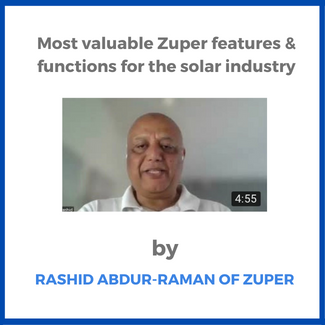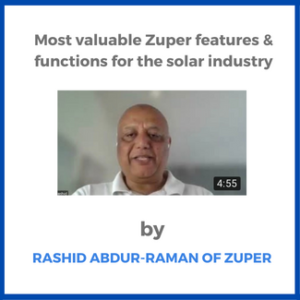In this video, Kerim Baran of SolarAcademy speaks with Rashid Abdur-Rahman of Zuper, a provider of an end-to-end field service management software application for solar and other field service businesses. Rashid digs into how their solution manages installation and service workflow and describes how Zuper drops into a company’s existing systems and integrates with top apps used by solar companies. The video is below.
Below is the video transcription:
Kerim Baran of SolarAcademy: Can you tell us a little bit about where in the solar industry you guys play? It’s on the residential side, commercial/industrial, or is it a more utility-scale and what your offering is for these types of users?
Rashid Abdur-Rahman of Zuper: Sure. Our focus is mostly on the residential, the single unit solar kind of world, whether it’s residential or business, whether it’s rooftop or whether it is multi-unit rooftop. It doesn’t really matter. There is the installation part of solar. We are not really suited for the completely vertically integrated offerings, like Tesla and stuff. But for someone who is acting as a system integrator, getting a customer, sourcing the material, doing the site surveys, getting those approvals and all that stuff.
We become very useful for these customers because we not only manage the solar installation project, but we also integrate with these other systems that these companies need to work with. For example, let’s say Zoho, you know, doing a solar installation as you very well know. Doing the actual job is one part of it. That is you’re doing the sales so some CRM is involved. You’re getting some financing done so some business process software is involved. You’re getting regulatory approvals, you’re coordinating with the power utility and all of that stuff.
So one advantage we have at Zuper is that we are easy to integrate. We offer those APIs. Plus we have started integrations with most of the popular integration tools out there, platforms out there. So we become an integrated part of the process. We work with customers like these system integrators where the deal happens in the CRM automatically and when the deal is closed it shows up as a job in Zuper. The project manager can assign it to a team and can get it scheduled.
Kerim: So you guys have the construction process as well?
Rashid: Yes. Through construction and then post-install as well. Let’s say survey construction, even the go live. Typically after construction, you’re waiting on someone to inspect, sign off, go live.
So while each of these processes probably are being kick started in Zoho or whatever the process workflow process is, we are updating that system from this job is done, this thing is installed. This requires an as-built, inspection because we have deviated from a design issue so we are flagging it.
So whatever’s happening we’re not relying on somebody, a team lead to come back and tell somebody. Somebody’s updating a process in Zoho, but we are automatically letting the people on the field themselves, set this up. Just to take one example, taking a lot of pictures is just an integral part of any solar job, whether it’s the service side or whether it is as the project is getting done. We have for each stage of the project, we call them status changes. All the different people on the field can take their pictures and basically the back office is seeing a whole album of these photos that have come in. So some customer calls and says, “Hey, this was not properly installed or some regulatory authorities are calling about, show me this particular photo of the front of the house or something.” The library’s available to the back office.
You don’t have to go hunting about who did what, when everything’s there and who did what. It’s also tracking safety protocols, for example, we can make those a necessary part of the checklist before the first stage. You can actually take the installation workflow and divide it up into different steps and you put a checklist for each step and you can have somebody go and sign off saying, “yes, they have put on the safety harnesses” just to throw an example out there. “Yes. We have inspected that the power is switched off.”
All those things, we can enforce the process out there in the field. Unless somebody’s going there and explicitly saying, “yes, this is checked off,” they can’t move through their job. Giving a new system to technicians makes sense but getting people to use a new system is always challenging. You have the option of controlling – you can’t move without doing this checkbox or you leave it optional. So we offer that flexibility and for the companies that are concerned about the fact that they have to enforce a behavior. You have the tools for other companies who are more likely to say, “let’s be flexible and let them just get the job done.” Exactly. Zuper is set up for that too.
Kerim: Got it, thank you very much for all this information.


